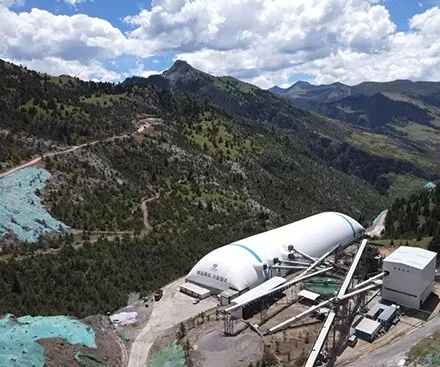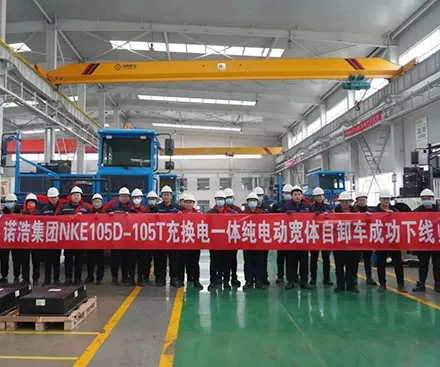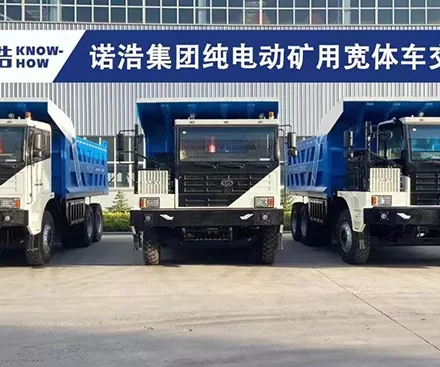In recent years, the construction and heavy machinery industry has seen a growing interest in electric equipment, driven by the need for eco-friendly solutions and advancements in battery technology. Electric excavators, in particular, have gained attention as a potential alternative to traditional diesel-powered machines. However, like any major investment, the decision to buy an electric excavator requires careful consideration of the benefits and challenges. In this article, we'll explore the pros and cons of purchasing an electric excavator to help you make an informed decision.
One of the primary reasons to consider an electric excavator is its eco-friendliness. Electric excavators produce zero emissions during operation, reducing their carbon footprint and contributing to cleaner air in construction sites and urban areas.
Electric excavators are quieter than their diesel counterparts. This can lead to a quieter and more pleasant work environment for both orators and nearby residents, especially in noise-sensitive locations.
Electric excavators tend to have lower operating costs compared to diesel excavators. Electricity is often cheaper than diesel fuel, and electric machines generally require less maintenance due to fewer moving parts and reduced wear and tear.
Electric excavators are known for their higher energy efficiency. Electric motors convert a larger portion of energy from the power source into actual work, resulting in potentially greater productivity on the job site.
Many electric excavators come equipped with regenerative braking systems that capture and store energy during deceleration. This stored energy can then be used to power the machine, contributing to overall efficiency.
Some regions offer incentives, grants, or tax breaks for adopting electric machinery as part of efforts to promote cleaner technologies. Additionally, certain construction sites might have strict emission regulations that make electric excavators a favorable choice.
7. Enhanced Performance in Certain Conditions
Electric excavators can offer improved performance in specific environments, especially where instant torque is required. The electric motor provides immediate power, making these machines highly responsive and efficient in tight spaces or for precision work.
5. Improved Operator Comfort
With fewer vibrations, reduced noise, and no exhaust fumes, electric excavators provide a more comfortable working environment for operators. This can lead to increased productivity and satisfaction among your team.
Electric excavators often come with a higher upfront cost compared to diesel-powered counterparts. The initial investment can be a significant factor for construction companies with budget constraints.
Electric excavators rely on batteries, which have a limited operating range before requiring recharging. The availability of charging infrastructure at job sites is a critical consideration for uninterrupted operations.
Charging an electric excavator's batteries can take several hours, which might lead to downtime during busy work schedules. Fast-charging solutions are being developed, but they might not be universally available yet.
Batteries are heavy, and incorporating them into the design of an excavator can impact its weight distribution and overall performance. Additionally, large batteries might limit the excavator's digging depth and capacity.
Operating and maintaining an electric excavator requires familiarity with electric systems, which might require additional training for operators and maintenance personnel.
Switching from diesel-powered to electric equipment might necessitate changes in work practices, such as scheduling charging times and considering battery life when planning tasks.
Electric excavators might not be as readily available as their diesel counterparts in certain markets, making procurement a challenge.
1. Workload and Applications: Evaluate the specific tasks and applications for which you need an excavator. If your projects involve continuous heavy-duty work, you might need to carefully assess the electric excavator's capabilities and potential limitations.
2. Job Site Infrastructure: Consider whether your job sites have the necessary charging infrastructure and access to electricity. Lack of charging points can hinder the effective use of an electric excavator.
3. Total Cost of Ownership: Compare the total cost of ownership, including initial investment, operating costs, maintenance, and potential incentives or rebates, between electric and diesel excavators.
4. Environmental Goals: If your company is committed to reducing its carbon footprint and adopting greener technologies, an electric excavator might align with your sustainability objectives.
5. Future Trends: Stay informed about advancements in electric construction equipment technology. As battery technology improves and charging infrastructure expands, the viability of electric excavators may increase.
The decision to buy an electric crawler hydraulic excavator depends on various factors, including your company's budget, operational requirements, environmental goals, and the availability of charging infrastructure. While electric excavators offer environmental benefits, reduced operating costs, and quieter operation, they also come with higher upfront costs, charging considerations, and potential adaptations to work practices. By carefully evaluating the pros and cons, considering your specific needs, and staying informed about industry developments, you can make an informed decision that aligns with your business goals and values.
Explore [The Insider's Views](https://www.know-howequipment.com/contacts/).
Specification
| Vehicle Spec. | Unit | NWE560V |
| Motor Type | / | Permanent magnet synchronous motor |
| Vehicle Weight | KG | 52500 |
| Bucket Capacity | m³ | 2.8 |
| Motor Type No. | / | YQW3-225D-17K-RA2 |
| Rated Power | Kw/R/Min | 280/1850 |
| Battery Capacity | Kwh | 350*2 |
| Rated Voltage | V | 576 |
| Walk Speed | km/h | 3.0/4.8 |
| Turning Circle Speed | r/min | 8.6 |
| Max Gradeability | Degree | 70 |
| Bucket Digging Power | KN | 298 |
| Ground pressure | kPa | 89 |
| Hydraulic Pump type | / | V90N230DP |
| Maximum discharge | L/min | 414x2 |
| Bucket Rod length | mm | 2550 |
| Swing Arm Length | mm | 6560 |
| A-Total Length | mm | 12190 |
| B-Total Width | mm | 3340 |
| C-Total Height(Swing Arm) | mm | 4050/4122 |
| D-Total Height(Cabin) | mm | 3280 |
| E-Ground Clearance | mm | 1300 |
| F-Ground Cleance | mm | 720 |
| G-Rear Tail Turning Radius | mm | 4440 |
| H-Crawler on ground length | mm | 4360 |
| J-Crawler Total Length | mm | 5390 |
| K-Rail Distance | mm | 2740 |
| L-Crawler Width | mm | 3340 |
| M-Crawler Plate Width | mm | 600 |
| N-Cabin Height | mm | 3316 |
| O-Max Digging Height | mm | 10000 |
| P-Max Dump Height | mm | 6760 |
| Q-Max Digging Depth | mm | 6260 |
| R-Max vertical Digging Depth | mm | 5620 |
| S-2.5m Digging Depth | mm | 6070 |
| T-Max Digging Distance | mm | 10580 |
| U-Max.digging distance on ground | mm | 10360 |
| V-Min Turn Radius | mm | 4825 |
| W-Max. height at min. turn radius | mm | 9250 |
| X-Distance rotation center to rear | mm | 4437.5 |
| Z-Counterweight Clearance | mm | 2623 |
| A1-On Ground Length | mm | 6520 |
1. Environmental Protection and Economic Performance
Zero exhaust emission achieved by battery power is beneficial to the protection of people and the working environment.
The battery-powered system does not produce any exhaust fumes, creating a cleaner working environment. Since they are also friendly to workers and trees around the vehicle, they will be widely used in various construction sites, including indoor construction, pipeline projects and urban construction.
2. Comfort and safety
Ensure long working hours with high capacity lithium-ion batteries
Equipped with the KNOWHOW lithium-ion battery system, they can store 350 kWh - 422KWH of on-board energy and run for about 8 hours*1 after a full charge. It takes approximately 9 hours*2 to fully charge the battery using the supplied charger.
The use of a silent motor greatly reduces the noise of the machine and the work site Since the power source is an electric motor, the machine does not produce any engine noise. The operator can easily communicate with surrounding workers during operation, ensuring safe and accurate work.
Reduce operator fatigue by eliminating machine vibration caused by the engine
As the machine has no engine, the vibration transmitted to the operator is greatly reduced. The operator does not feel stress and fatigue while working and can work more comfortably.
Achieve a comfortable working environment by reducing the heat generated by the machine
Since there is no heat source from the engine, the area around the machine does not get hot, making work more comfortable.
3. Safety, reliability, serviceability
Equipped with highly safe and reliable battery components
Komatsu uses its proprietary matching technology to optimise the entire vehicle control system by coordinating the lithium-ion batteries provided by KNOWHOW, which has a good track record in handling heavy loads and commercial vehicles in various fields around the world, and mechanical components such as hydraulic pumps, controllers and motors for working equipment operation, while Komatsu has also developed a robust battery protection structure. Komatsu has achieved digging performance and durability comparable to engine-driven hydraulic excavators.

Jul. 23, 2022
View More
Jun. 15, 2022
View More
Jun. 01, 2022
View More